The relationship between Japan and South Korea is complex, multifaceted, and deeply rooted in historical, cultural, economic, and political dynamics. Over the years, it has oscillated between cooperation and tension, shaped by a shared history marked by colonization, war, and territorial disputes, as well as intertwined economic interests and strategic alliances. To understand the current state of their relationship, it’s crucial to delve into the historical context, examine key issues and challenges, and explore avenues for potential cooperation and reconciliation.
Historical Context:
The historical relationship between Japan and Korea has been fraught with tensions, largely stemming from Japan’s colonization of Korea from 1910 to 1945. During this period, Japan imposed harsh policies aimed at eradicating Korean culture and identity, leading to widespread resentment and resistance among the Korean population. The legacy of colonization continues to influence perceptions and attitudes on both sides.
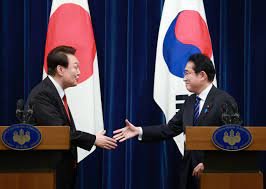
One of the most contentious issues is the treatment of comfort women, thousands of Korean women who were forced into sexual slavery by the Japanese military during World War II. Despite efforts to address this issue through apologies and compensation, it remains a source of friction between the two countries, with South Korea insisting on a more sincere acknowledgment of Japan’s responsibility.
Another significant issue is the territorial dispute over the Takeshima/Dokdo islands in the Sea of Japan/East Sea. Both countries claim sovereignty over these islands, which are strategically important due to their potential maritime resources and geopolitical significance. The dispute has led to diplomatic tensions and periodic flare-ups, exacerbating bilateral relations.
Economic Interdependence:
Despite historical animosities, Japan and South Korea have become major trading partners and economic allies. Both countries are industrial powerhouses with highly developed economies and advanced technological capabilities. Trade between Japan and South Korea is robust, encompassing a wide range of industries, including automotive, electronics, and shipbuilding.
However, economic relations have also been subject to fluctuations and disruptions due to political tensions. In recent years, trade disputes have arisen, leading to retaliatory measures such as export controls and boycotts. These disputes highlight the delicate balance between economic interdependence and geopolitical rivalry.
Political and Security Cooperation:
Japan and South Korea share common security concerns, particularly in the face of North Korea’s nuclear and ballistic missile programs. Both countries are allies of the United States and participate in trilateral security cooperation aimed at addressing regional security challenges. However, historical animosities and territorial disputes have hindered closer political and security cooperation between Japan and South Korea.
Efforts to enhance security cooperation have been hampered by historical grievances and nationalist sentiments, as well as domestic political considerations. Despite shared interests, trust deficits and divergent strategic priorities have impeded progress in areas such as intelligence sharing and military cooperation.
Cultural and People-to-People Exchanges:
Cultural exchanges and people-to-people contacts play a crucial role in shaping perceptions and fostering mutual understanding between Japan and South Korea. Despite historical tensions, there is a deep appreciation for each other’s cultural heritage and traditions, reflected in the popularity of Korean pop culture (K-pop) and Japanese anime and manga in both countries.
However, cultural exchanges are not immune to political tensions and nationalist sentiments. Instances of cultural appropriation and historical revisionism have sparked controversy and strained bilateral relations, underscoring the need for sensitivity and dialogue in promoting cultural understanding and reconciliation.
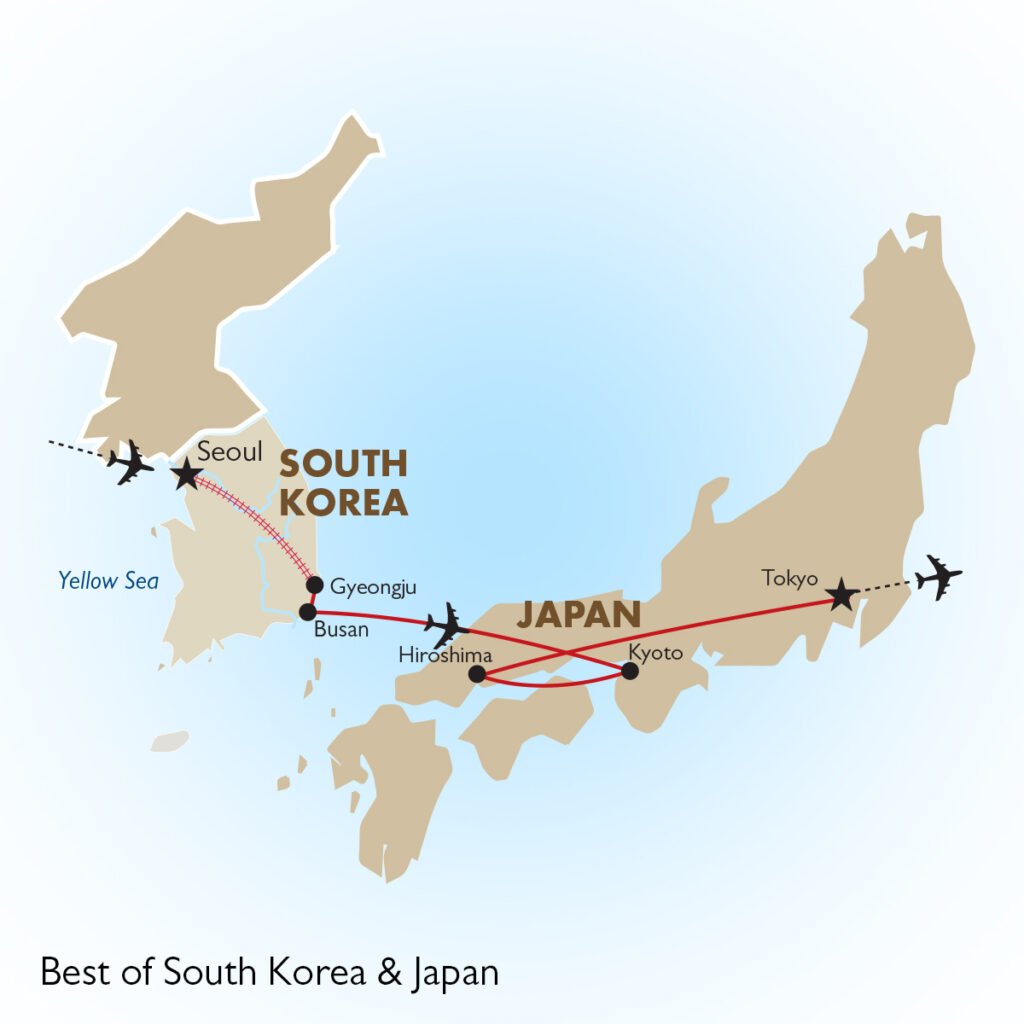
Challenges and Opportunities:
The relationship between Japan and South Korea faces numerous challenges, including historical grievances, territorial disputes, and geopolitical rivalries. These challenges are exacerbated by domestic politics, nationalist sentiments, and shifting regional dynamics. However, there are also opportunities for cooperation and reconciliation, particularly in areas such as economic integration, cultural exchange, and security cooperation.
Efforts to address historical grievances and promote reconciliation require sincere dialogue, mutual understanding, and a willingness to confront difficult truths. Historical reconciliation is not only a moral imperative but also a pragmatic necessity for fostering lasting peace and stability in Northeast Asia.
Despite the obstacles, there have been instances of cooperation and dialogue between Japan and South Korea, such as the 2015 agreement on comfort women and trilateral summits with China. These initiatives demonstrate the potential for pragmatic cooperation and conflict resolution, even in the face of entrenched historical animosities.
Conclusion:
The relationship between Japan and South Korea is characterized by a complex interplay of historical legacies, economic interdependence, political tensions, and cultural exchanges. While historical grievances and territorial disputes continue to strain bilateral relations, there are also opportunities for cooperation and reconciliation.
Efforts to promote reconciliation require sincere dialogue, mutual understanding, and a commitment to confronting difficult truths. By addressing historical grievances, fostering economic integration, and enhancing cultural exchanges, Japan and South Korea can build a more stable and prosperous future for Northeast Asia.
Ultimately, the path to reconciliation will require leadership, vision, and a willingness to overcome entrenched nationalist sentiments and political obstacles. Despite the challenges, the shared interests and common aspirations of the Japanese and Korean people provide a foundation for building a more peaceful and cooperative relationship in the years to come.
Economic ties between Japan and Korea
The economic ties between Japan and South Korea are deep and multifaceted, characterized by extensive trade, investment, and technological cooperation. Both countries are among the world’s largest economies and major trading partners, with complementary industrial strengths and highly developed manufacturing sectors. Here are some key aspects of their economic relationship:
Trade:
Japan and South Korea have a robust trade relationship, with bilateral trade volume reaching billions of dollars annually. Both countries engage in the exchange of a wide range of goods and services, including automobiles, electronics, machinery, chemicals, and consumer products.
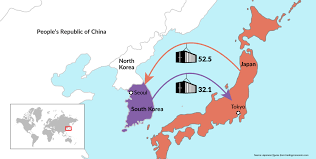
While trade between Japan and South Korea is substantial, it has also been subject to fluctuations and periodic tensions, particularly in recent years. Disputes over historical issues and trade policies have occasionally led to trade frictions and retaliatory measures, impacting the flow of goods and services between the two countries.
Investment:
Investment flows between Japan and South Korea are significant, with companies from both countries investing in each other’s economies to capitalize on market opportunities and technological expertise. Japanese companies have a strong presence in South Korea, particularly in industries such as automotive, electronics, and consumer goods. Similarly, South Korean firms have made investments in Japan, particularly in sectors such as entertainment, retail, and finance.
Technological Cooperation:
Japan and South Korea are both leaders in technology and innovation, with thriving research and development sectors and world-class capabilities in areas such as electronics, robotics, automotive engineering, and biotechnology. Collaborations and partnerships between Japanese and South Korean companies and research institutions are common, leveraging each other’s strengths to drive innovation and competitiveness.
Supply Chain Integration:
Both Japan and South Korea are integral parts of global supply chains, with many multinational corporations relying on inputs and components from both countries for their manufacturing processes. The integration of supply chains between Japan and South Korea extends beyond bilateral relations to encompass broader regional and global networks, highlighting the interdependence and interconnectedness of their economies.
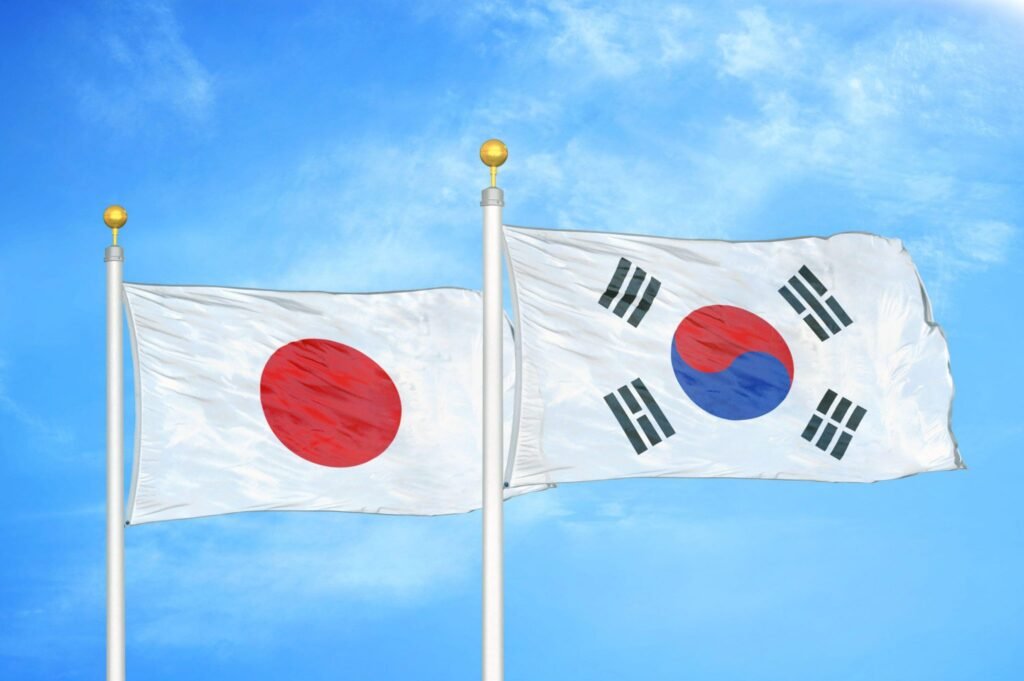
Challenges and Opportunities:
Despite the substantial economic ties between Japan and South Korea, the relationship faces challenges stemming from historical animosities, territorial disputes, and political tensions. Trade disputes and nationalist sentiments have periodically strained economic relations between the two countries, leading to disruptions in trade and investment flows.
However, there are also opportunities for deeper economic cooperation and integration between Japan and South Korea. Both countries share common interests in promoting regional stability, economic prosperity, and technological advancement. Efforts to address historical grievances and foster reconciliation could pave the way for closer economic ties and collaboration in the future.
Conclusion:
The economic relationship between Japan and South Korea is characterized by extensive trade, investment, and technological cooperation. Despite occasional tensions and disputes, both countries recognize the importance of their economic ties and the benefits of cooperation and integration. Efforts to address political differences and historical issues could unlock new opportunities for deeper economic engagement and mutual prosperity between Japan and South Korea.
Military ties between Japan and South Korea
The military ties between Japan and South Korea are complex and have been historically influenced by their shared history, regional security concerns, and alliances with the United States. While both countries face common security challenges, such as the nuclear threat posed by North Korea and broader regional stability issues, their military cooperation has been limited by historical animosities and territorial disputes.
Historical Context:
The historical relationship between Japan and South Korea casts a long shadow over their military ties. Japan’s colonization of Korea from 1910 to 1945 and its actions during World War II, including the conscription of Korean laborers and the use of comfort women, have left deep scars on the Korean psyche and continue to shape perceptions of Japan’s military intentions.
Current Military Cooperation:
Despite historical tensions, Japan and South Korea have recognized the need for pragmatic cooperation on security issues, particularly in the face of North Korea’s nuclear and ballistic missile programs. Both countries are allies of the United States and participate in trilateral security cooperation with the U.S., aimed at addressing regional security challenges.
One significant aspect of military cooperation is intelligence sharing, particularly regarding North Korea’s activities. Japan and South Korea share intelligence with the United States through various channels, including the Trilateral Information Sharing Arrangement (TISA), which facilitates the exchange of intelligence on North Korean threats.
Another area of cooperation is joint military exercises and training. While direct bilateral military exercises between Japan and South Korea are rare due to political sensitivities, both countries participate in multilateral exercises with the United States and other regional partners, such as the annual Foal Eagle and Key Resolve exercises.
Challenges and Limitations:
Despite the shared security concerns, military cooperation between Japan and South Korea faces significant challenges, primarily stemming from historical grievances and territorial disputes. The legacy of Japan’s colonization of Korea and its actions during World War II continue to hinder trust-building efforts and limit the scope of military cooperation.
Territorial disputes, such as the sovereignty dispute over the Takeshima/Dokdo islands, further complicate military ties between Japan and South Korea. The disputed islands are located in a strategically important area, and both countries have conducted military exercises and patrols in the vicinity, raising tensions and increasing the risk of inadvertent escalation.
Domestic politics and nationalist sentiments also play a role in shaping military relations between Japan and South Korea. Public opinion in both countries is often skeptical of closer military cooperation with the other due to historical grievances and concerns about national sovereignty.

Future Prospects:
Despite the challenges, there are opportunities for Japan and South Korea to enhance military cooperation and address shared security concerns. Efforts to promote reconciliation and historical understanding could help overcome barriers to cooperation and pave the way for closer military ties.
Pragmatic cooperation on specific security issues, such as intelligence sharing and joint maritime surveillance, could serve as confidence-building measures and lay the groundwork for broader military cooperation in the future. Regional security dynamics, including the evolving threat posed by North Korea and China’s growing military assertiveness, may also create incentives for closer collaboration between Japan and South Korea.
Ultimately, the path to deeper military ties between Japan and South Korea will require political will, leadership, and a commitment to overcoming historical grievances in the interest of regional stability and security. While the road ahead may be challenging, the shared security interests of Japan and South Korea provide a compelling rationale for closer military cooperation in Northeast Asia.
Japan and South Korea in the South China Sea
Military ties between Japan and South Korea have been historically complicated due to their shared history, lingering animosities, and regional security dynamics. However, both countries face common security challenges, including North Korea’s nuclear threat and China’s assertiveness in the region, which have provided impetus for cooperation in recent years, albeit with limitations and obstacles.
1. Historical Context:
- Japan’s colonization of Korea from 1910 to 1945 and its brutal occupation left deep scars in Korean society, shaping perceptions and attitudes towards Japan.
- Post-World War II, Japan’s Self-Defense Forces were limited by its pacifist constitution, while South Korea faced security threats from North Korea, leading to a reliance on the United States for security guarantees.
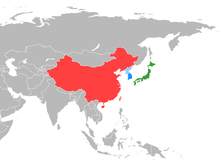
2. Bilateral Military Relations:
- Despite historical tensions, Japan and South Korea have engaged in limited military cooperation, primarily through trilateral mechanisms involving the United States.
- The signing of the General Security of Military Information Agreement (GSOMIA) in 2016 aimed to enhance intelligence-sharing between Japan and South Korea, particularly in response to North Korea’s provocations.
3. Limitations and Challenges:
- Despite the GSOMIA agreement, military cooperation between Japan and South Korea remains constrained by historical animosities and domestic opposition in both countries.
- Nationalist sentiments and public backlash against the perceived “normalization” of relations with Japan have hindered deeper military ties.
4. North Korea Factor:
- The common threat posed by North Korea’s nuclear weapons and ballistic missile programs has catalyzed security cooperation between Japan, South Korea, and the United States.
- Trilateral military exercises and coordination have been conducted to enhance deterrence and response capabilities against North Korean provocations.
5. China’s Role and Regional Dynamics:
- China’s growing assertiveness in the region, particularly in the South China Sea, has raised concerns for both Japan and South Korea.
- While Japan has taken a more proactive stance in maritime security and defense cooperation with other regional partners, South Korea has adopted a cautious approach to avoid antagonizing China, its largest trading partner.
6. South China Sea Dynamics:
- Japan and South Korea share interests in upholding freedom of navigation and maintaining stability in the South China Sea, a vital maritime artery for global trade.
- While Japan has voiced support for international law and norms in the South China Sea and conducted joint exercises with the United States and other partners, South Korea has maintained a relatively neutral stance to avoid provoking China.
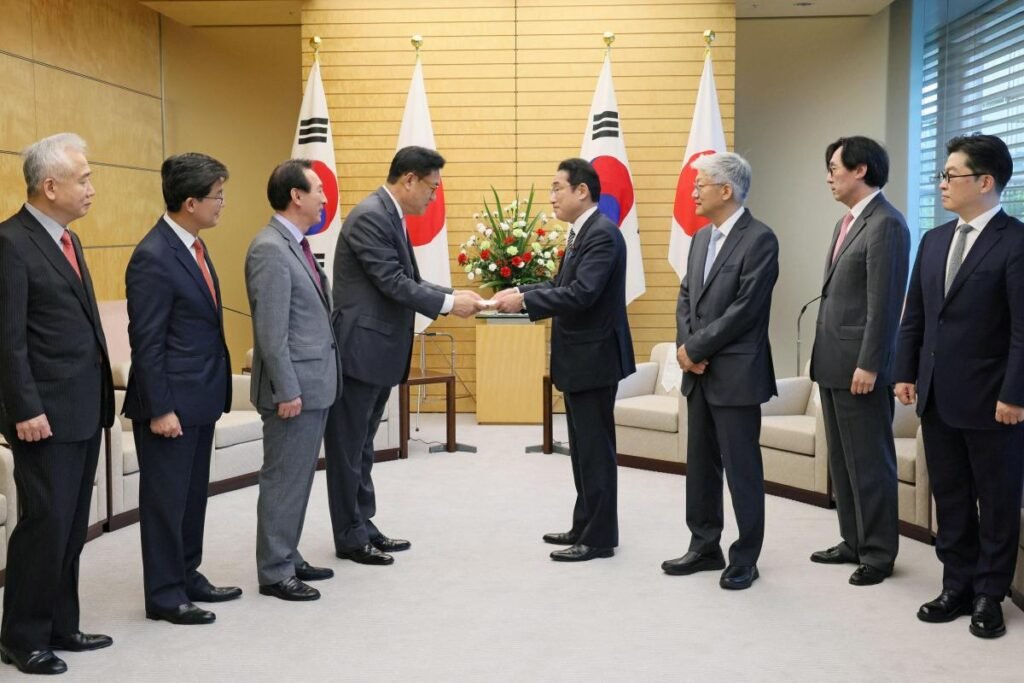
7. Future Prospects:
- The trajectory of military ties between Japan and South Korea will depend on various factors, including the evolution of regional security dynamics, domestic politics, and leadership changes in both countries.
- Despite challenges, ongoing dialogue and confidence-building measures may pave the way for greater military cooperation between Japan and South Korea in addressing shared security threats and promoting stability in Northeast Asia.
In summary, while military ties between Japan and South Korea have faced historical obstacles and remain constrained by domestic and regional factors, common security challenges, particularly posed by North Korea and China, have spurred limited cooperation and dialogue between the two countries. The future trajectory of their military relations will depend on their ability to navigate historical sensitivities, build trust, and address shared security concerns in a rapidly evolving regional landscape.
